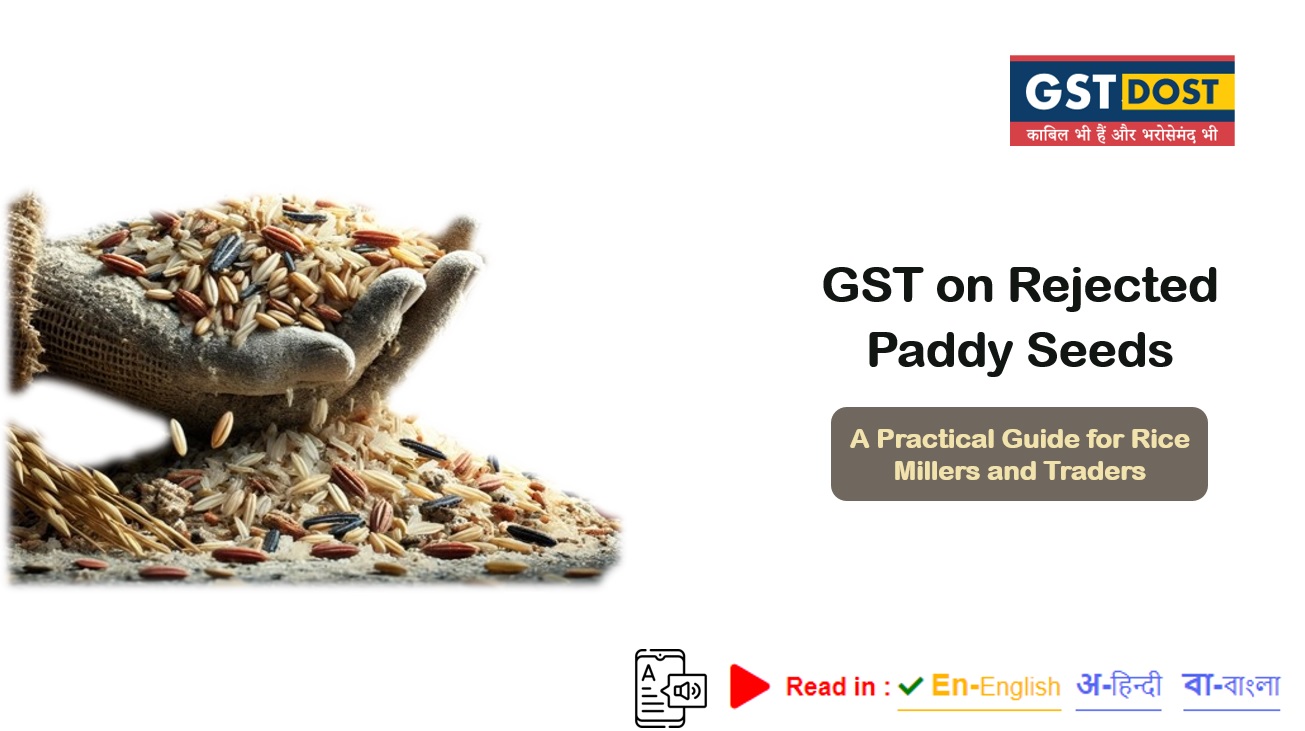Namaste!
Understanding the GST implications on Rejected Paddy Seeds is crucial for rice millers and traders. Proper classification and compliance with GST not only ensure legal adherence but also benefit your business operations. This blog provides a detailed overview of how GST applies to Rejected Paddy Seeds and highlights key points that every rice miller and trader should know.
What are Rejected Paddy Seeds?
Rejected Paddy Seeds are rice grains that do not meet the standards of seed quality. These seeds lack essential qualities such as sprouting capacity, purity, and disease-free characteristics.
Key Reasons:
# These seeds are often damaged, infested with fungus, or contaminated by pests.
# They are not suitable for use as seeds and are unfit for human consumption.
Primary Uses of Rejected Paddy Seeds
Rejected Paddy Seeds are primarily used in industrial applications and animal feed rather than for food purposes. Key uses include:
i. Industrial Use: These seeds are used in industries for biofuel production or other industrial processes.
ii. Cattle and Poultry Feed: Rejected Paddy Seeds are used as feed for cattle and poultry.
iii. Manure Production: They are also utilized in the production of manure.
Why are Rejected Paddy Seeds Unfit for Human Consumption?
Rejected Paddy Seeds lack the food quality found in edible rice. They are often contaminated, impure, and unsafe for human consumption due to the presence of harmful elements such as fungus, pests, and other impurities.
Correct HSN Code for Rejected Paddy Seeds and GST Classification
The correct classification for Rejected Paddy Seeds under GST is HSN Code 1006 10 90. This code applies to paddy that is not fit for human consumption and is designated for industrial use.
Avoid Misclassification:
# HSN 1006 10 is only applicable to rice fit for human consumption.
# It is incorrect to classify Rejected Paddy Seeds under HSN 1006 10 as they are not suitable for human consumption.
Is there any GST Exemption on Rejected Paddy Seeds?
No, Rejected Paddy Seeds do not qualify for any GST exemption. According to Notification No. 02/2017-Central Tax (Rate), dated 28.06.2017, only rice that is not pre-packaged and labelled, and fit for human consumption is exempt from GST.
Since Rejected Paddy Seeds do not meet these criteria, they are not eligible for GST exemption.
Does GST Apply to Rejected Paddy Seeds Sold in Packs Above 25 kg?
Yes, GST is applicable on Rejected Paddy Seeds even when sold in packs weighing more than 25 kg. The GST rate remains consistent due to the nature and quality of these seeds.
GST Rate on Rejected Paddy Seeds
Rejected Paddy Seeds are subject to a 5% GST rate (2.5% CGST + 2.5% SGST), regardless of their use in industrial applications or animal feed.
Important Tips for Rice Millers and Traders
i. Ensure Correct Classification: Rejected Paddy Seeds must be classified under HSN Code 1006 10 90.
ii. Comply with GST Rates: Apply the correct GST rate of 5% and do not expect any exemptions.
iii. Maintain Proper Documentation: Keep accurate records and documentation for industrial use or sales to ensure smooth GST compliance.
Conclusion
Compliance with GST regulations for Rejected Paddy Seeds is essential. These seeds cannot be considered as edible rice, and no exemptions apply. By ensuring proper classification and GST compliance, you can avoid legal complications and steer your business in the right direction.
Conduct your business with accurate information, safeguard against tax-related risks, and ensure that your Rejected Paddy Seeds are correctly classified and compliant with GST requirements.
Disclaimer:
This blog is intended for informational purposes only. Always consult your GST consultant before making any business decisions.
#GSTCompliance #RiceMillers #RejectedPaddySeeds #IndustrialUse #AnimalFeed #TaxRegulations #BusinessOperations #LegalAdherence




